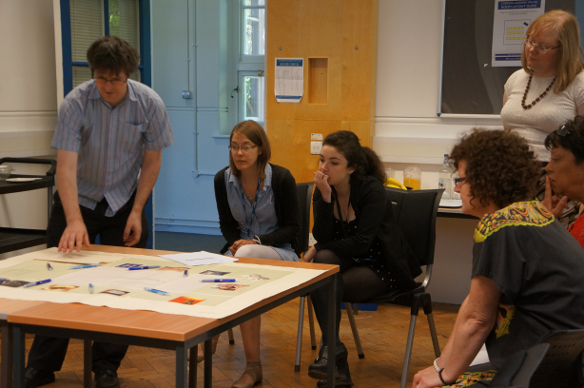Introduction
For the s econd year running I have opted to put my SEDA Fellowship report on my website (last year's here). Although I am currently working at the LLAS Centre for Languages, Linguistics and Area Studies at the University of Southampton, I will be joining the Centre for Learning and Teaching at the University of Brighton in September. I was offered the Brighton job back in May so I am very much in a transition frame of mind at present.
econd year running I have opted to put my SEDA Fellowship report on my website (last year's here). Although I am currently working at the LLAS Centre for Languages, Linguistics and Area Studies at the University of Southampton, I will be joining the Centre for Learning and Teaching at the University of Brighton in September. I was offered the Brighton job back in May so I am very much in a transition frame of mind at present.
Career development
After ten years at the LLAS Centre (counting the centre in its LTSN/ HEA subject centre forms) I felt it was now time to move on and undertook a UK-wide job search. The end result was an offer from the Centre of Learning and Teaching at the University of Brighton. Last week I visited Brighton for the university’s internal teaching and learning conference and heard about a lot of the interesting things about some of the interesting things which are going on there. It was also nice to spend time getting to know some of my new colleagues as well.
Statistics for Humanities

This past year has been mostly project based. My Statistics for Humanities student ‘text-book’ is available in draft form and I am awaiting comments from the British Academy nominated reviewers. The British Academy agreed that I could put a draft online for a crowd sourced review. This has led to receiving many helpful comments, and one academic in particular has provided some very extensive feedback. I have long been dissatisfied with introductory statistics textbooks. I hope that mine will reach out to students (and academics) who struggled in the past. The examples in the book come from the humanities and I have attempted to write a book which uses a verbal reasoning-based approach which should resonate better with humanities students than some other texts.
EU Quality Assurance project

We are coming to the end of the second year of this 2-year EU-funded project, Sharing Practice in Assuring and Enhancing Quality (SPEAQ) which follows on from LANQUA (the Language Network for Quality Assurance). I didn’t work on LANQUA and hadn’t worked on an EU-project before. I was quite apprehensive about being involved in the project as I had seen colleagues undergoing the stresses of running a project which involves administrative complications (e.g. currency conversions and daily rates) as well as working alongside colleagues in other countries who work in very difference pedagogic, policy and quality environments. Fortunately our assistant director (and my line manager) Alison Dickens is an experienced director of EU–projects and our senior administrator Sue Nash has worked on them before, so, fortunately for me, I have been able to concentrate mostly on content issues.

In the first year of the project we developed a workshop in which staff, students and quality managers can participate together. I played a big role in this aspect of the project producing a dialogue sheet and writing facilitator instructions. Along with our Danish colleague Ole Helmersen from Copenhagen Business School I attended the EQAF Forum in Tallinn, Estonia where we tried out the workshop on a large group of quality professionals from a range of European countries.
As well as running the workshop the EQAF conference was a great staff development opportunity for me. As a QE person rather than QA person it was interesting the meet people who operate in very different QA systems. The UK seems to be fairly in the middle between those countries in which QA is very highly centralised and regulated through to countries where QA is virtually non-existent—at least in the way that I understand it. If there is one thing that all countries seem to have in common it is that QA appears very different from teaching. As one person I met pointed out, a poor teacher is not a quality issue as far as most university structures are concerned. Even at the Senior Manager level there is often a separation of roles between the person in which of QA and the person who in charge of teaching and the curriculum.
For the second part of the project each partner does their own small-scale project which meets a particular institutional need. At Southampton we decided to do a project on feedback, called "Getting the Most Out of Feedback" (GMOOF). The core principle of GMOOF is that everybody, whether a member of teaching staff, a student or a quality manager, is both a provided and recipient of feedback. The principles of good feedback: Relevant, Timely, Meaningful and with Suggestions for improvement (See Race online), apply to all feedback, not just feedback from teacher to student but also student to teacher, student to student, teacher to teacher etc., teacher to quality manager, teacher to professional body etc. etc. GMOOF is a website which focuses on giving good feedback and making the most of feedback from others rather than focusing on different job roles. (The website is under development at present). A workshop based on the project is being developed and will be piloted in Southampton in September – I’ll be in Brighton by then so will not be leading it(!) Additional material for the website includes a card sort (built using the free software nanDECK), a series of feedback videos with reflective questions (built in xtranormal and put up on youtube), videos of interviews about feedback with the project team and other colleagues at Southampton, and online quizzes for staff and students. There is also a section specific on how we at Southampton work to enhance the quality of teaching across the university.
Teaching
My teaching this year has focused in two major areas. I have been contributing to the interdisciplinary Curriculum Innovation module “Sustainability in the Local and Global Environment"). 2012-13 was the first time this module has run and I benefited greatly from working with National Teaching Fellow Simon Kemp. It has been some years since I taught undergraduates and the modules made extensive use of technology (including Twitter, Panopto, Blackboard) and had a variety of assessments including a presentation, conference paper and group film project.
My other teaching responsibility has involved teaching research skills to (mostly Humanities) doctoral students. I have run numerous sessions on everything from putting the thesis together, preparing for the viva, ethnographic methods, critical thinking and applying for funding. Most of my materials are available in the HumBox under a Creative Commons license. Students produce critical reflections on the sessions, which also provide me with feedback.
Other work.
I continue to undertake evaluation for Routes into Languages programme which is funded to increase the uptake of languages in schools. I was recently a keynote speaker at the conference Innovative Language Teaching and Learning at University: Enhancing the Learning Experience through Student Engagement at the University, which was held at the University of Manchester.
I also presented at the LLAS e-learning symposium about my online open access language teaching research website YazikOpen. I have also been preparing materials for the LLAS annual Heads of Department workshop, which is entitled “Thriving for the Public Good”
Future
At Brighton I am expecting to be involved in a variety of academic development activities including working with teaching staff to apply for the HEA Fellowships, blended learning and undertaking research. I will also being going to Plymouth in November to undertake PASS (Peer Assisted Study Session) Supervisor Training.











